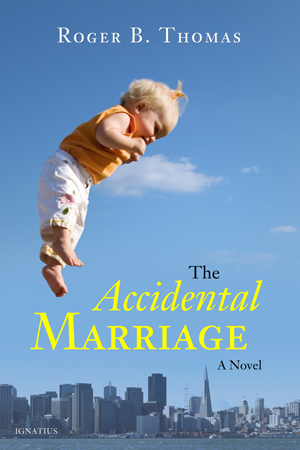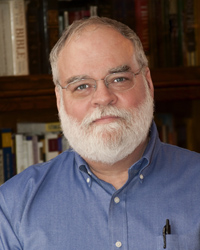Roger Thomas and His New Novel, The Accidental Marriage
by Sarah Reinhard | November 17, 2014 12:01 am
 [1]The Accidental Marriage: A Novel (Ignatius Press), by Roger Thomas, is a take on the issue of love that not only got my attention, but that also kept me smiling.
[1]The Accidental Marriage: A Novel (Ignatius Press), by Roger Thomas, is a take on the issue of love that not only got my attention, but that also kept me smiling.
Scott and Megan are friends, each in separate same-sex relationships. Megan and her lover decide to have a baby, and it’s natural to Megan that Scott be the donor. As it happens, Megan gets pregnant and her lover abandons her after some abusive acts. Scott, ever the problem-solver, comes up with a plan that involves Megan moving in and being his housekeeper.
Their friendship grows, but their life sort of falls apart in the background. In the midst of this, something happens, changes, deepens.
Throughout the story, Scott and Megan never “change” from their same-sex attraction. They are united because of mutual need and they each have to sacrifice for the other. Their friendship makes this possible in the beginning.
The two make quite a pair, and it’s not at all easy. For one thing, there’s a kid involved. For another thing, there’s the issue of same-sex attraction.
Which, as it turns out, isn’t really an issue.
What Thomas has done—in addition to putting together some scenarios that made me laugh out loud—is humanize the face of same-sex attraction. He hasn’t said it’s okay; if anything, this book proves the opposite without being nasty about it. He has kept the dignity of the person, painted the delight of the experience of realization, and crafted a story that’s more than enjoyable.
This book is light years away from the preachy attitude, the “better than you” approach, the “me right, you wrong” heavy-handedness that the Church is so often characterized as taking. There is nothing being shoved down your throat as you read this book. Instead, there is the offer of perspective based in real humanity.
All of that is part of the reason I was so eager to interview Thomas about The Accidental Marriage. Not only is it an important novel, but it’s well done.
What was your inspiration for the novel? Where did the idea come from?
Oddly, it was an online article I read, wherein a woman who was living the lesbian lifestyle was writing about the difficulties and expenses faced by women in her position when it came to conceiving. She spoke of the expenses and medical risks of all the interventions, and how that was a barrier to some couples wishing a child. She concluded by saying in an almost offhand manner that a last-ditch option would be to contact a gay friend and get him to “contribute” to the cause.
I reflected on that article and the outlook it expressed—what a shallow understanding of the depths and complexities of human interactions that occur when a couple comes together to conceive a child. Soon the characters of Scott and Megan, and their life circumstances, were forming in my imagination.
 [2]
[2]Roger B. Thomas
How did your characters come to life?
Like many authors, I tend to “write what I see,” in the sense that these scenes are painted or projected on the “screen” of my imagination, and I just write down what shows up there. As the characters become more clear, at times by the very act of writing, they take on a life and character of their own. One finds oneself writing something, then stopping and saying, “No, Scott would never say that,” and correcting it.
How does this impact the conversation about gay marriage?
It wasn’t written with any intent to do so. Scott and Megan consider themselves gay, and do get married, but none of this is in the sense which our culture means in the current discussion of “gay marriage.” In a sense, the situation in The Accidental Marriage is the polar opposite of the scenarios usually offered as justification for “gay marriage” – it’s a man and woman in a fertile union who get married for very prosaic reasons, even though they’re not “in love,” whereas arguments for “gay marriage” proposes infertile union of partners of the same sex who want to get married because they’re “in love.”
You call this a love story…why do you say that?
Because the main motivation behind the major decisions in the story is love—it just isn’t romantic love. When his friend is in need, Scott is driven to help as he can, even though the cost of that help keeps increasing. Megan responds to these expressions of love with love of her own, caring for Scott in her own sensitive way. The real test of this love is the trials they undergo, which engender some confusion but clarify what is truly important for both of them.
What do you hope readers take from reading The Accidental Marriage?
One thing I hope it makes clearer is that love takes many forms and expressions, and they’re all valid. A constant undertone in our culture, particularly in the entertainment industry, is that real love will always somehow get around to romantic involvement. That’s simply not true.
I also hope that the story will help people to see that all of us are hurting humans in need of love and understanding. An unfortunate fallout of the current “culture wars” is that we can forget that no human is truly our enemy, but all should be loved and understood as best we can. This doesn’t mean that we automatically accept and approve everything they do (any more than we expect people to accept and approve everything we do), but we should strive to understand and communicate with each other.
What age would you say your novel is appropriate for?
I’d say upper high school and up. It definitely deals with mature themes, in the most precise sense of the term (in other words, that isn’t a euphemism for “filth”). There is a little language in there, but that was an attempt to reflect the reality of the lives Scott and Megan would have been living.
How do you envision people reading your book as groups? What topics do you hope this inspires in discussion?
I wasn’t thinking of people reading it in groups when I wrote it, but there’s no reason they couldn’t—in fact, there’s a discussion guide posted on the ipnovel.com website[3]. I hope it sparks discussion about the real meanings of “love” and “marriage,” as well as the importance of conception and birth to human relationships.
You have a number of children and grandchildren. What would your reaction be if one of them admitted to SSA?
This isn’t just a distant hypothetical, for I know families to whom this has happened. The first thing I’d make clear is that this didn’t mean this person was some sort of freak or super-sinner. We’re all broken humans who struggle with a variety of things. I think that something that adds a lot of pressure to the current discussion is the unspoken assumption on all sides that experiencing same-sex attraction is in itself some kind of existential statement about the person (“you’re gay!”). This simply isn’t true. I recently read an enlightening interview with a man who’d come out of the gay lifestyle (there are thousands, if not millions, of such people) who identified SSA as “another human brokenness.” That’s a good way to look at it.
Thus, the next question I’d ask would be, “Where does it hurt?” I recently read an account of a person who’d attended a healing conference where they dealt with many things, including this person’s same-sex attraction. One of the ministers made the very wise observation that the Lord didn’t want to heal her of SSA, He wanted to heal her of the underlying wounds that were causing the SSA.
To continue the hypothetical, another question I’d ask would be, “What do you plan to do about this?” If this person were to simply struggle with these urgings as best he could while adhering to God’s moral law, then one could offer unqualified support. But if the person decided that these urgings justified breaking God’s moral law, that would pose a different set of problems. This happened to a family I know, where a daughter’s revelation that she was a lesbian was followed by her abandoning her marriage. This always poses knotty questions on how to deal with the particular actions—but then, so does divorce and remarriage.
How do you think the conversation of love transcends the discussion of sexuality?
Love in all its forms always expresses a desire for union with the beloved. This union comes in many forms, such as in The Accidental Marriage where Scott and Megan build a life together.
In our hypersexualized society, where sex is used to sell everything from medicines to auto parts, all desire for union is viewed through a sexual lens. Personally, I can’t help but wonder how much this tends to distort the discussion of same-sex marriage. We need to reduce the sexual temperature of our culture and accept that the union desired by love can have many expressions.
How did your Catholic worldview shape your writing?
I hope it gives me a more true anthropology. Our current understanding of who we are as humans is deeply informed by materialistic, mechanistic presuppositions that affect the assumptions we make about human nature and relationships. Much of my adult education has been unlearning things I learned in my youth, not so much because I was taught them but because they were the assumed framework of my learning. There are many good teachers of this, but I’ve learned a lot from C.S. Lewis, G.K. Chesterton, Sheldon Vanauken, and Peter Kreeft. These are all examples of true Christian humanists whose work reflects a true anthropology.
What was the most difficult aspect of writing this book?
Taking the characters through hard times. Because an author so identifies with his characters, when they suffer, you suffer. Particularly difficult were Scott’s recurring abandonment dream, Scott losing his job, and Megan’s trials with Diane (though these were mostly “offstage”).
- [Image]: http://www.integratedcatholiclife.org/wp-content/uploads/roger-thomas-the-accidental-marriage-cover-w300.jpg
- [Image]: http://www.integratedcatholiclife.org/wp-content/uploads/roger-thomas-w200.jpg
- there’s a discussion guide posted on the ipnovel.com website: http://www.ipnovels.com/wp-content/uploads/2014/10/The-Accidental-Marriage-discussion-guide.pdf
Source URL: https://integratedcatholiclife.org/2014/11/reinhard-roger-thomas-and-his-new-novel-the-accidental-marriage/